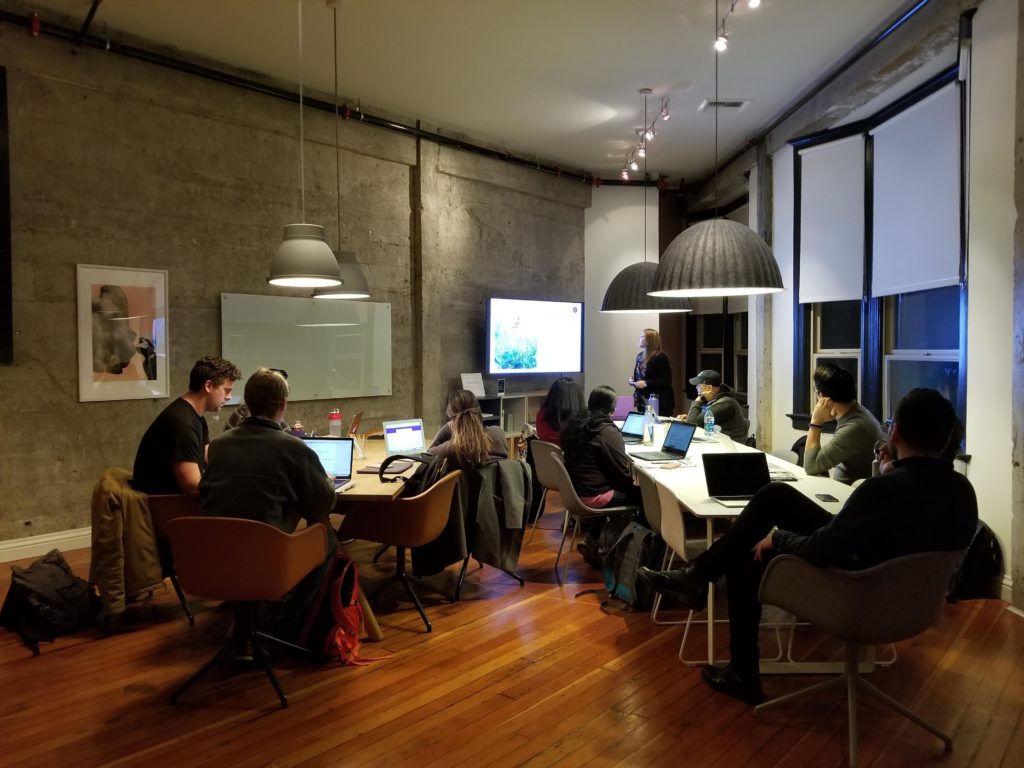Project-based learning (PBL) enables students to learn deeply and develop core employability skills through participating in real work projects and experiences. It has benefits for students, education institutions and industry. With Practera’s support, organising project-based learning is cost-effective and simple.
What is project-based learning?
Project-based learning (PBL) is a teaching method that drives student learning by engaging them in real-world, meaningful projects. It’s a style of inquiry-based and student-centred learning. In PBL, students work in groups over a set period on a project designed to solve a genuine problem or answer a challenging question. Students demonstrate their knowledge and skills by creating a product or presentation for a public audience.
Project based learning activities allow students to develop deep content knowledge. Importantly, PBL also supports development of 21 st century skills such as critical thinking, collaboration, creativity and communication. PBL education is used across various learning environments, including high schools and universities.
It’s important to distinguish a PBL project from a traditional school or college project. Educators sometimes use light projects to supplement other learning activities. This can be likened to icing on a cake. In contrast, PBL is like the cake itself – it forms the substance of unit learning and skill development.
Why use project based learning?
The simple answer is that contemporary work is often project-based work. Forces including globalisation, automation and growth of the gig economy mean predictable and repetitive jobs are increasingly uncommon.
Instead, many current students’ careers will involve working on a series of projects. It therefore makes sense for them to have experience with project-based work, along with the knowledge and skills required to be a successful project team member.
What are the benefits of project based learning?
Project based learning also has other advantages for students. These include:
- Deeper engagement and interaction with learning content
- Encouragement of higher order thinking and problem-solving skills
- Development of peer and professional networks
- Engagement with potential employers and career mentors
- Fostering of 21 st century skills like collaboration and communication
- Enhanced autonomy and agency in learning
- A sense of mastery and self-efficacy
- Gaining valuable career insights.
Benefits for universities and industry
Universities and other educational institutions can also benefit from offering project-based learning that connects students with real-world projects and clients. The capacity to offer students high- quality PBL projects creates a differentiation point that can help you attract and retain students, improve their employability and satisfaction, and foster important partnerships with community, government and industry partners.
For educators, the PBL model can expand their repertoire of pedagogical strategies and lead to greater job satisfaction.
For industry, a PBL approach gives you access to teams of talented students eager to learn and apply their up-to-date academic knowledge. It creates opportunities to upskill staff in coaching and mentoring, and to meet potential job candidates.
Establishing a program
If implementing a PBL program sounds like a great idea, it’s important to understand how to do it well before you get started. Research by the Buck Institute for Education has shown that a successful PBL unit must include some essential design elements for deeper learning, higher engagement and better-quality work to occur.
They are:
- A challenging problem or question – the project must involve a meaningful, real-world problem that needs solving or question that needs answering, at an appropriately challenging level.
- Sustained inquiry – PBL projects need to give students the chance to engage in an extended, thorough process of questioning, finding resources, and applying information.
- Realism – the project must involve a real-life situation or task, or be related to the students’ personal concerns, life issues and interests.
- Student voice and choice – students need to be included in making decisions about the project, such as what they will create and how, and be allowed to communicate their ideas in their own voices.
- A public product for a real audience – the project needs to result in a piece of work that is shared with or presented to an audience beyond the classroom, such as industry clients or the public.
- Reflection – educators and students reflect on their learning, the quality of work produced, any challenges that arose, and the success of strategies used to overcome them.
- Feedback and revision – through reflection and critique, students should give, receive, and apply feedback (including formative and summative assessment) to enhance their processes and products.
When effectively designed, implemented and scaffolded, PBL can have a huge impact on the quality and success of your teaching practices.
How Practera can help
This might all sound quite complex, and it is if you’re trying to set everything up yourself. But with Practera’s help and resources, implementing project-based learning is simple.
Our dedicated team can help with our project-based learning managed services which help find you the most suitable program for your students and connect them with industry leaders. By connecting with our team, we offer continuous support in our programs with a dedicated program manager to ensure your students get the most out of their learning experience.
Our fully supported and quality assured programs are designed to easily connect university students with genuine industry experiences, internships and projects.
These are curated from thousands of global employers, including government departments, corporates and community organisations. Our expansive library of cost-effective project types facilitates projects ranging from two-week micro-internships to custom PBL programs to suit your requirements—all digitally enabled and scalable to thousands of learners.
Importantly, Practera can deliver these PBL programs virtually. Our innovative and user-friendly platform is designed to optimise learning quality and the student experience, regardless of whether programs are used onsite or remotely.
30-day free trial
Receive an exclusive 1:1 onboarding for your 30-day free trial with one of our experts and learn how to author, manage and launch amazing experiential learning programs with one easy-to-use platform.
Monitoring progress and outcomes
Feedback about progress and outcomes is crucial for successful PBL, and you’ll want to ensure your PBL programs are achieving the desired results. Practera has you covered with our range of feedback, assessment and performance tracking tools.
Quality feedback to enhance learning outcomes
Quality feedback is one of Practera’s core strengths. Our platform allows students to receive individualised feedback from industry, peers and educators at exactly the right time to drive critical reflection, deep learning, and better performance. Integrated feedback support tools enhance the quality, consistency and timeliness of feedback—the key ingredient of successful learning! Our Team360 assessments also allow you to embed a peer feedback loop into your learning programs.
Easily assess educational outcomes
Practera gives you multiple options for assessing and progressing student learning. You can easily set up different types of assessments, commonly moderated assessments which allow for a feedback loop, along with question-and-answer options such as multiple choice and checkboxes.
For grading student work, Practera offers user-friendly rubrics that help you efficiently provide consistent and impartial grading. You can easily track participant engagement, progress and deliverables, pinpoint any issues with individual students or teams, and support them throughout their PBL experience.
Advanced technology enhances user experience
You can also monitor and quality assure your programs using Practera’s real-time analytics and data dashboards. At a glance, you can quickly identify any issues before they become bigger problems, or dig deeper for more detailed analysis. You can also capture end of program reports.
We even have a world-first AI-assistant, known as ELSA, designed specifically for experiential learning. ELSA provides 24/7 monitoring to provide real-time recommendations based on research- backed learning science, saving you time and helping deliver optimal student learning outcomes.
With COVID-19 meaning some PBL must take place virtually, Practera’s inbuilt feedback, assessment and performance tracking devices allow educational institutions to still deliver PBL activities without sacrificing learning quality.
Download your free PDF copy of this blog




Pbl is the real deal. It’s like taking learning to a new level. Who doesn’t want to solve real world problems and show their skills to a real people? It’s all about those 21st-century skills we need in the workforce.